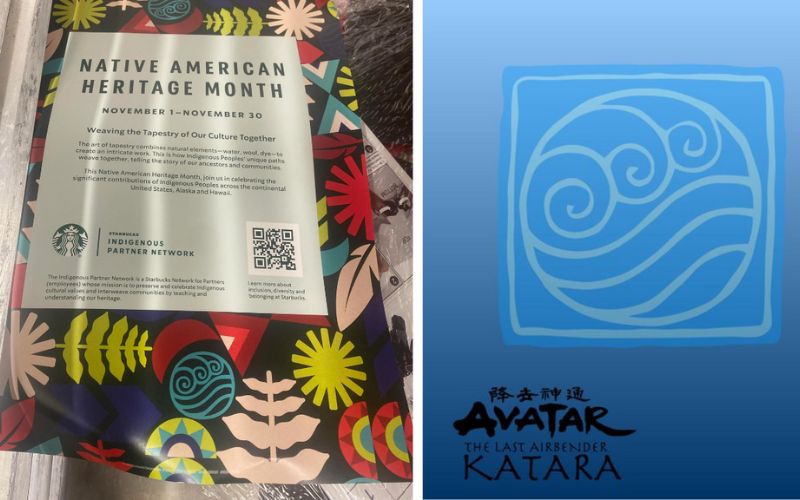
- Details
- By Kaili Berg
Starbucks locations around the country have displayed the posters in break rooms, back offices, and in view of customers, Business Insider reported.
The outrage comes as the misconceptions about Native Americans persist through the continued exploitation and misinterpretation of Native Americans in advertising, merchandising, and trademarks amongst popular brands. The National Musuem of the American Indian in Washington D.C. houses a permanent exhibit titled "Americans" that features ads, toys, film clips, toys, weapons and hundreds of other Native-themed objects, illustrating the paradox of everpresent false Native depictions in popular culture and absence of actual Native representation.
French luxury fashion company Christian Dior, faced backlash in 2019 after deploying an insensitive depiction of Native Americans in an ad for fragrance.
People have called out Starbucks on social media for using the fictional tribal symbol on the poster. Here is what Indian Country is saying about the matter:
heartashley: It’s so funny but how frustrating to feel like we are not important enough to find the correct symbolism. Or even respected enough to just ask.
Unique-Breath-7466: As a Native American, it would’ve been a great opportunity for the company to feature the tribes located near each region. We suffer enough from erasure. The least they could do is recognize those of us who are still here.
Ntnlwyn: Well, as an indigenous person I’m not big mad. Her character is one of the few mainstream representations of indigenous people. The water tribe is based on the Inuit people. I would rather it be a real symbol with art made in collaboration with indigenous artists, but I learn not to expect too much.
Cryptkidmykie: Literally my people did not experience almost complete genocide of our people and our culture so you could have some white company man do a quick google search and slap an appreciation poster together in paint.
Giiwedin Shawandase: As much as I love Starbucks, I think our relationship has officially come to an end. They posted a campaign to support Native American History Month and used symbols from The Last Airbender. We are not fictional characters, WE ARE STILL HERE.
Although the problematic poster may seem mundane to some, a fictional symbol from an animated television show on a poster recognizing Native American Heritage Month shows the true misunderstanding of Native symbols and the cultural significance that they hold.
“Starbucks has always been inspired by what matters most to our partners (employees), which includes working alongside our Indigenous Partner (Employee) Network to develop meaningful partner-led programming and community initiatives that honor our partners’ creative vision and intent for Native American Heritage Month,” a Starbucks Public Relations Representative told Native News Online.
“This was very unintentional and we did work very closely with our partners to create this initiative.”
By 2025, the popular coffee company vowed to have people of color represent 30 percent of its corporate employees at all levels. According to Starbucks, American Indians and Alaska Natives makeup .06% of the company’s employees
More Stories Like This
Native News Weekly (August 25, 2024): D.C. BriefsNative News Weekly (March 1, 2026): D.C. Briefs
Scope Narrowed, Report Withheld: Questions Mount Over Michigan Boarding School Study
Zuni Youth Enrichment Project Announces Family Engagement Night and Spring Break Youth Programming
Next on Native Bidaské: Leonard Peltier Reflects on His First Year After Prison
Help us defend tribal sovereignty.
At Native News Online, our mission is rooted in telling the stories that strengthen sovereignty and uplift Indigenous voices — not just at year’s end, but every single day.
Because of your generosity last year, we were able to keep our reporters on the ground in tribal communities, at national gatherings and in the halls of Congress — covering the issues that matter most to Indian Country: sovereignty, culture, education, health and economic opportunity.
That support sustained us through a tough year in 2025. Now, as we look to the year ahead, we need your help right now to ensure warrior journalism remains strong — reporting that defends tribal sovereignty, amplifies Native truth, and holds power accountable.
 The stakes couldn't be higher. Your support keeps Native voices heard, Native stories told and Native sovereignty defended.
The stakes couldn't be higher. Your support keeps Native voices heard, Native stories told and Native sovereignty defended.
Stand with Warrior Journalism today.
Levi Rickert (Potawatomi), Editor & Publisher


